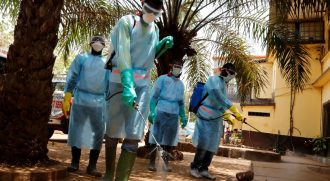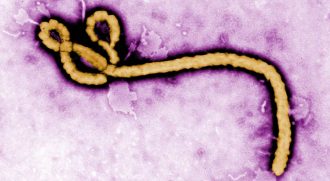Health & Medicine
-
 Health & Medicine
Health & MedicineStarchy foods may cut meaty risks
Eating red meat can increase the risk of certain types of cancer. But scientists have discovered that eating potatoes and other foods containing 'resistant' starch can help limit those risks.
-
 Health & Medicine
Health & MedicineEbola emerges in the Congo
The Democratic Republic of Congo (formerly Zaire) is where the Ebola virus was first discovered in 1976. This nation has just been hit again by the disease. Scientists suspect this is a new and independent outbreak — not a spread of the epidemic ravaging West Africa.
By Janet Raloff -
 Health & Medicine
Health & MedicineEbola treatments and vaccines could be near
Using experimental medicines against Ebola might help to slow or end an outbreak in Africa that has defied efforts to control it.
By Nathan Seppa -
 Health & Medicine
Health & MedicineExplainer: What is Ebola?
A virus is behind the hemorrhage-inducing infection called Ebola. It causes fevers and often intense bleeding — seemingly from anywhere and everywhere.
By Janet Raloff -
 Health & Medicine
Health & MedicineCookie Science 2: Baking a testable hypothesis
I would like to make a gluten-free cookie that my friend can eat. But to do that, I need to come up with a hypothesis to test.
-
 Health & Medicine
Health & MedicineFist bumps cleaner than handshakes
A handshake, while welcoming, can transmit lots of germs — many times more than a high five or, especially, a fist bump.
By Janet Raloff -
 Animals
AnimalsGerms explain some animal behaviors
The bacteria that people and other animals host in and on their bodies are invisible to the eye. Yet they can play a very visible role in behavior. It’s something scientists are just coming to appreciate.
-
 Animals
AnimalsOctopus sets egg-nurturing record
Animals will do extraordinary things to help their babies survive. Consider ‘Octomom:’ She sat on one clutch of eggs for nearly 4.5 years.
-
 Tech
TechFashioning inks to ‘print’ tissues
3-D printing may one day create life-saving tissues and organs for transplants. But first researchers are learning how to tailor cell-filled “inks” for use in inkjet printers.
-
 Microbes
MicrobesRecord Ebola epidemic strikes
A record outbreak of the deadly disease has already claimed nearly 1,000 lives in West Africa. Scientists suspect bats or eating some other wild animals may have triggered the epidemic.
-
 Tech
TechBiometrics: New IDs that are uniquely you
Fingerprints are so last century. Computers soon may start identifying people by their eyebrows, heartbeats or even networks of blood vessels under the skin.
-
 Brain
BrainLacrosse: Different genders, same injuries
Scientists find that boys’ and girls’ versions of lacrosse lead to similar injuries. Because girls frequently get concussions, the study argues that like the boys, girls too should wear helmets.